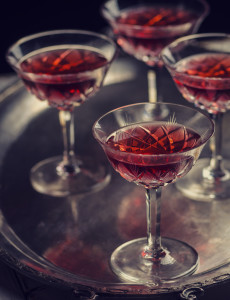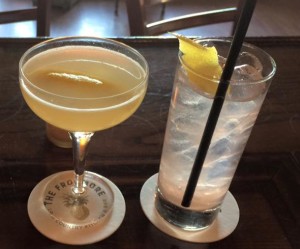Boston’s liquor laws can be almost as confusing to navigate as its street plan. Besides well-known ordinances like the ban on Happy Hour, the lesser known cordial and liqueur permit straps local watering holes with serving limitations. Bars like The Frogmore in Jamaica Plain and Lulu’s in Allston have had to get creative with their beverage lists under the restrictions of the liqueur-only law, which dictates just which bottles they can stock. Bartenders Alex Homans and Jessica Gooch have worked within the confines to shake up tasty, cordial-based cocktails and below, they talk the challenges and positives (if any) of their liquor licensing.
 The confusion around the cordial permit starts with the definition of cordials themselves. MA legislature provides some guidance by pulling out key characteristics: a spirit, plus flavoring from fruits, flowers, plants, juices or extracts. Most importantly, no matter the infusion blend or steeping time, the final product has to clock in with at least 2.5 percent sugar by weight. To put it more simply, Homans, who manages The Frogmore’s bar program, calls a cordial “anything that’s not a pure distilled spirit.” That can run the gamut, however, from coffee liqueurs and classic Italian amari to Pisco and full-proof, flavored vodkas.
The confusion around the cordial permit starts with the definition of cordials themselves. MA legislature provides some guidance by pulling out key characteristics: a spirit, plus flavoring from fruits, flowers, plants, juices or extracts. Most importantly, no matter the infusion blend or steeping time, the final product has to clock in with at least 2.5 percent sugar by weight. To put it more simply, Homans, who manages The Frogmore’s bar program, calls a cordial “anything that’s not a pure distilled spirit.” That can run the gamut, however, from coffee liqueurs and classic Italian amari to Pisco and full-proof, flavored vodkas.
The license restrictions seem counterintuitive to the hospitality industry and much of the work for bar staff is finding substitutions to fulfill guest requests for go-to, spirit-forward drinks like Old Fashioneds and vodka sodas. At Lulu’s, the bar program focuses on what Gooch calls “loose interpretations of classic cocktails” and the team accommodates traditional orders with a twist. A vodka martini, for instance, gets reimagined as the French Cucumber with cucumber vodka, elderflower liqueur, lime, muddled cucumber and Champagne. At The Frogmore, Homans strives to keep his list approachable by juxtaposing “ingredients and flavors that people can recognize alongside ones that might be new or different,” and matching liqueur sweetness with acidity for a balanced beverage. He says that, overall, putting together the cordial-only list isn’t much different than planning with a full liquor license: “you’re just painting with a different palette.”
 The permit certainly saddles bars with challenges (including possibly alienating inflexible clientele and boxing in talented bartenders), but there can be some, small benefit to the unique nature of a limited list. “It actually provides a nice foundation for young staff to get to know the product on a deeper level,” says Gooch. “They also pick up on the cocktail list quickly because they are frequently guiding guests through our list and helping them make suggestions.”
The permit certainly saddles bars with challenges (including possibly alienating inflexible clientele and boxing in talented bartenders), but there can be some, small benefit to the unique nature of a limited list. “It actually provides a nice foundation for young staff to get to know the product on a deeper level,” says Gooch. “They also pick up on the cocktail list quickly because they are frequently guiding guests through our list and helping them make suggestions.”
Not that it rationalizes the restrictions in any way, but the resulting cocktails are delicious. Gooch favors The Revolver, a spin on a Manhattan that features honey whiskey, orange bitters and coffee liqueur in place of vermouth. Homans reaches for the Winding Wando, a refreshing Pisco-based cocktail with cardamom, apricot liqueur and fresh-squeezed lemon juice. The best way, after all, to clear up any confusion about what a cordial and liqueur permit entails cocktail-wise is to taste through an inspired list like the ones at The Frogmore and Lulu’s.

















